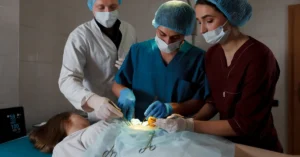Liver transplant is a crucial procedure for individuals battling severe liver disease or failure, offering a chance for renewed health and vitality. However, the complexity of this surgery means that patients face a range of potential risks and complications.We will delve into the various surgical risks associated with liver transplant, such as infection, bleeding, anesthesia issues, and more. By understanding these risks, patients and their families can better prepare for the challenges and navigate the recovery process with greater confidence.
Infection Risks and Management
Infection Risks
Following a liver transplant, infection risks are notably high due to the immunosuppressive medications used to prevent organ rejection. These medications can weaken the body’s natural defenses, making it more susceptible to bacterial, viral, and fungal infections. Common infection sites include the surgical wound, lungs, and urinary tract.
Management Strategies
Effective management of infection risks is crucial for a successful liver transplant recovery. Here are key strategies to mitigate these risks:
- Prophylactic Antibiotics: Administered both before and after liver transplant surgery to prevent infections. These antibiotics help reduce the risk of postoperative infections by targeting potential pathogens early.
- Regular Monitoring: Frequent check-ups and diagnostic tests are essential for early detection of infections. Blood tests, imaging studies, and clinical assessments help identify infections before they become severe.
- Strict Hygiene Practices: Maintaining strict hygiene practices, including hand washing and sterile techniques, is vital. Patients and caregivers should adhere to these practices to minimize the risk of infections.
- Vaccinations: Vaccinations may be recommended to protect against certain infections. It’s important for patients to discuss necessary vaccinations with their healthcare provider to ensure adequate protection.
- Prompt Medical Attention: Any signs of infection, such as fever, redness, or swelling at the surgical site, should be reported immediately to a healthcare provider. Early intervention can prevent the progression of infections and complications.
By following these strategies, patients undergoing liver transplant surgery can significantly reduce their risk of infections and improve their overall recovery process.
Bleeding and Blood Clotting
Bleeding Risks During Liver Transplant Surgery
Liver transplant surgery involves intricate procedures that can lead to significant bleeding. The liver is a highly vascular organ, meaning it has a rich supply of blood vessels, which makes controlling bleeding a critical aspect of the surgery. Excessive bleeding can complicate the operation and extend recovery time.
Blood Clotting Complications Post-Surgery
After the surgery, patients are at risk of blood clots due to changes in blood flow and clotting factors. Blood clots can form in veins or arteries and may lead to severe complications such as deep vein thrombosis (DVT) or pulmonary embolism. These conditions require prompt attention to prevent further health issues.
Management Strategies for Bleeding and Clotting Issues
- Close Monitoring: Frequent blood tests are essential to monitor clotting levels and detect any bleeding issues early.
- Medications: Anticoagulants or blood thinners are often prescribed to reduce the risk of blood clots, helping to prevent complications.
- Blood Transfusions: During and after surgery, blood transfusions may be required to manage significant blood loss and support recovery.
- Surgical Precision: The surgical team employs advanced techniques and tools to minimize bleeding and ensure the operation is performed with precision.
- Postoperative Care: Regular follow-ups and careful observation in the recovery room help manage and address any bleeding or clotting problems promptly.
Managing bleeding and blood clotting complications is essential for the success of liver transplant surgery. Effective strategies and careful monitoring ensure a smoother recovery process and help mitigate potential risks associated with the procedure.
Anesthesia
Anesthesia-related complications are a significant concern in liver transplant surgery. While anesthesia is crucial for ensuring the patient remains unconscious and pain-free during the procedure, it carries potential risks that can impact the overall success of the liver transplant. These complications can include allergic reactions, respiratory issues, cardiovascular problems, and more. Here’s a closer look at these risks and their management:
- Allergic Reactions: Some patients may experience allergic reactions to anesthesia medications. This can lead to symptoms such as rash, itching, or more severe reactions. Pre-anesthesia assessments help identify any allergies or sensitivities.
- Respiratory Issues: Anesthesia can affect breathing, potentially causing complications like difficulty in breathing or decreased oxygen levels. Monitoring during surgery ensures any respiratory issues are promptly addressed.
- Cardiovascular Problems: Anesthesia may impact heart function, leading to issues such as irregular heartbeats or changes in blood pressure. Continuous monitoring of cardiovascular parameters is essential to detect and manage these problems.
- Nausea and Vomiting: Post-anesthesia nausea and vomiting are common side effects. Medications are available to manage these symptoms and help the patient recover more comfortably.
- Delayed Wakefulness: Some patients may experience delayed wakefulness after anesthesia, affecting their recovery. Close monitoring in the recovery room allows healthcare providers to manage this issue effectively.
Effective management of anesthesia-related complications is crucial for a successful liver transplant surgery. Through thorough pre-anesthesia assessments, vigilant monitoring during the procedure, and prompt post-operative care, many of these risks can be minimized, ensuring a smoother recovery process.
Organ Rejection and Immune Response
Organ rejection is a significant concern following a liver transplant. The body’s immune system may recognize the new liver as a foreign object, leading to an immune response against it. This can manifest as acute or chronic rejection, which can affect the success of the liver transplant and the patient’s overall health.
Types of Rejection
- Acute Rejection: Occurs within the first few weeks to months after surgery. It is often sudden and can be managed with increased doses of immunosuppressive medications.
- Chronic Rejection: Develops over months or years and involves gradual loss of liver function. It is more challenging to treat and may lead to the need for a repeat transplant.
Management Strategies
- Immunosuppressive Medications: These drugs are crucial for preventing organ rejection by suppressing the immune system. They are typically prescribed for life and must be taken exactly as directed.
- Regular Monitoring: Frequent blood tests and liver biopsies are essential to detect early signs of rejection. These tests help in adjusting medications and addressing issues before they become severe.
- Lifestyle Adjustments: Adopting a healthy lifestyle, including a balanced diet and avoiding infections, supports overall immune health and reduces the risk of rejection.
- Patient Education: Understanding the signs of rejection, such as jaundice or abdominal pain, and seeking prompt medical attention is vital for managing potential issues effectively.
- Follow-up Care: Ongoing appointments with a liver specialist are necessary to ensure the transplanted liver remains healthy and to monitor for any signs of rejection.
Managing organ rejection and the immune response is crucial for the long-term success of liver transplant surgery and the overall well-being of the patient.
Long term Surgical and Health Risks
After a liver transplant, patients face several long-term surgical and health risks that need ongoing management and vigilance. Understanding these risks helps in planning a comprehensive liver transplant recovery strategy and maintaining long-term health.
Long-term Risks
- Chronic Organ Rejection: One of the most significant long-term risks after a liver transplant is chronic rejection, where the immune system gradually attacks the transplanted liver. This can lead to progressive liver damage and loss of function over time. Patients require continuous immunosuppressive therapy to manage this risk effectively.
- Recurrence of Liver Disease: In some cases, the original liver disease that led to the need for a transplant may recur in the new liver. For instance, hepatitis C or alcoholic liver disease can return, potentially impacting the health of the transplanted organ. Regular monitoring and follow-up care are essential to detect and manage these issues early.
- Increased Risk of Cancer: Post-transplant patients have a higher risk of developing certain types of cancer, such as lymphoma and skin cancer, due to prolonged immunosuppressive medication use. Regular screenings and preventive measures are critical for early detection and management.
- Medication Side Effects: Long-term use of immunosuppressive medications can lead to side effects like kidney damage, high blood pressure, and diabetes. It is vital to monitor for these side effects and adjust medications as needed to minimize their impact.
- General Health Complications: Over time, patients may experience general health issues such as cardiovascular disease, osteoporosis, or metabolic syndrome. Maintaining a healthy lifestyle, including a balanced diet and regular exercise, can help mitigate these risks.
Understanding and managing these long-term risks are crucial for ensuring a successful liver transplant outcome and improving the quality of life for patients.






